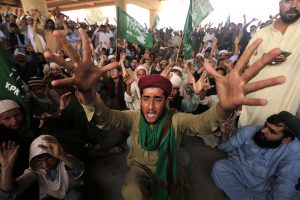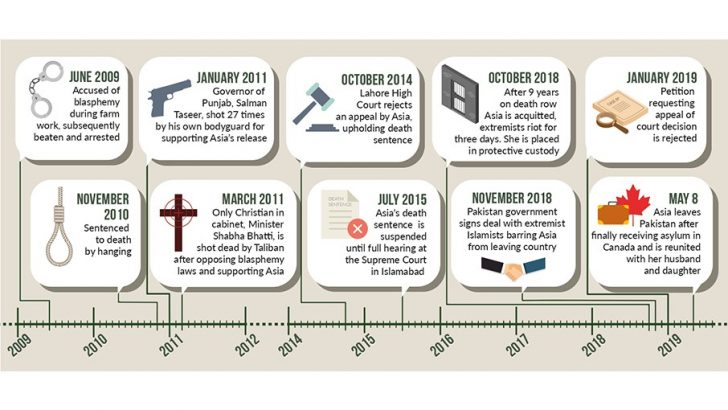Chai Brady speaks to Aid to the Church in Need who helped save Asia Bibi
After the celebrated news that persecuted Christian Asia Bibi reached Canada this month after a decade of incarceration and death threats in Pakistan, there was a collective sigh of relief, but also an understanding that there are still many others suffering under the country’s blasphemy laws.
Behind much of the advocacy and battle for freedom was Aid to the Church in Need (ACN), a charity that helps persecuted Christians around the world. Only now some of the work that they did, the high-level talks and complications they faced have been revealed. Throughout Asia’s decade long ordeal, her lawyer, a Muslim man, stood by her despite death threats and abuse.
Speaking to The Irish Catholic the Director of ACN Ireland, Michael Kinsella, said one of the most difficult tasks the charity faced was to find and fund a “compassionate” lawyer well-versed in the punitive code in Pakistan and in Shariah law upon which it’s based.
Saif-ul-Mulook stayed with Asia “through thick and thin”, Mr Kinsella said, “and his own personal life was wrecked as a result of association with Asia Bibi”.
“He was roundly mocked by other Muslims telling him that he wasn’t a proper Muslim for defending her, he received death threats constantly, and it was something that really did intrude in the most perverse way imaginable upon his health and safety.”
Protests
There was widespread protests and violence when Mrs Bibi was found innocent of blasphemy in Pakistan in October last year. The government, citing fears for her safety, kept her in protective custody after extremist Islamist groups protested for three days and made death threats.
Political parties such as Tehreek-e-Labbaik (TLP), whose sole aim is the punishment of blasphemy and keeping the country’s blasphemy laws which carry an automatic death penalty, were behind much of the protests and violence.
Mr Kinsella said: “The more media attention that was brought on the case, the more it was highlighted to Islamic extremists in Pakistan and beyond.
“One had to be very careful that in highlighting the case there wasn’t anything seen to be done that was either designed to be punitive against Islam as a religion or indeed against Muslims per se.
“This was not easy, but remember that Asia Bibi herself represented a test case. There is still well over 120-130 Christians who are imprisoned in Pakistan who have been accused of the same ‘crimes’ as Asia Bibi, the fight continues on that particular front.”

Bibi of blasphemy. Photo: CNS.
It was dangerous for anyone to speak out – for instance the governor of Pakistan’s Punjab province, Salman Taseer, was assassinated by one of his bodyguards for speaking in her defence in 2011. Mr Taseer was shot 27 times.
Mr Kinsella commended Asia’s daughter and husband who visited the UK last year and spoke out saying that the other incarcerated Christians should not be forgotten after the victory of securing Asia’s freedom.
“That is to say this is not just a victory for Asia Bibi at a personal and familial level, it is also a victory for Christians, and the right of Christians, minority Christians, to peaceably assemble and worship together as a community and express their faith in a meaningful fashion and having their faith as part of their identity is not something that has always been respected,” Mr Kinsella said.
Mrs Bibi was jailed 10 years ago next month following false accusations she had insulted Muhammad. Her lawyer confirmed she had arrived in Canada on May 8 and was reunited with her family who fled Pakistan for asylum last year.
“There are still well over 120-130 Christians imprisoned in Pakistan who are accused of the same ‘crimes’ as Asia Bibi”
Pakistan’s Supreme Court acquitted Mrs Bibi after they found there was no evidence to support the allegation which was brought by Muslim villagers following a row about a cup of water in June 2009 during her work on a farm.
The incident highlights the harsh blasphemy laws that exist in Pakistan, and how they are used to persecute religious minorities.
During Asia’s incarceration Mr Kinsella said it was “extraordinarily difficult” to get news about her.
“In order to establish in terms of a human rights point of view, whether or not her human rights were being respected required access, access that was not always given. And access even when it was given, was under very heavy censorship and monitoring. Establishing her welfare, ensuring that her human rights were being upheld; her rights of worship, religious freedom and expression were not adhered to really at all during her incarceration.”
Securing a country that Asia could seek asylum in was the next challenge. There were many names put forward and high-level talks entered into, finally Canada was decided on.
Mr Kinsella said: “What people don’t know, the hidden background in this, is a lot of the countries that were opening their doors to many, many Muslims, some of whom were from war torn regions were apprehensive about offering asylum.”
Because of this, he said, many of these countries didn’t and wouldn’t offer asylum because they feared a backlash from Muslim minorities, which was particularly the case in the UK.
“They were afraid that if Asia Bibi was brought there, because there’s such a strong link between Pakistan and Pakistani Muslims living in the UK, that it really wasn’t worth it. It was seen as an incitement to violence and that perhaps the freedom that she so long desired and deserved would be undone fairly swiftly by a radical living in the UK.”
He added that finding the right country was a “diplomatic dance” that went on for many years, but was particularly pressurised in the final months following her acquittal. “The struggle continues to advocate and protect Christians wherever they may be imprisoned or tortured or murdered or even simply just prejudiced against wherever they may be. This was one of the key learnings for me from the whole process.”
If you would like to donate to Aid to the Church in Need – Ireland, visit here.


 Chai Brady
Chai Brady
